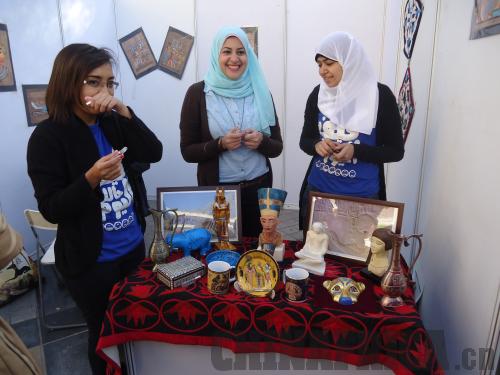|

Connected by art
The campus tour in Peking University lasted a week. It kicked off with an exhibition of photographs by Jurgen Schadeberg, a famous artist known as the father of South African photography. His works depict the lives and efforts of South African people during the anti-apartheid struggle.
"Before, apartheid was just a historic event I had read about in my textbooks," said Huang Lijun, a sophomore, "but through the photos I can really see the history. It is very touching and impressive."
Another exhibition was run by Li Songshan, a former Chinese diplomat who had been stationed in Africa. Now he is a famous expert and collector of Tanzanian Makonde sculpture. Chinese painter Yang Yan also participated in this event with his wife Neneh Ada Yang, who is African, and showed her mastery of Chinese water ink painting techniques.
"It's very interesting to see artists from both sides use the other's art and culture to create," said Wang Weijing, a junior at Peking University.
Previous campus tour events included a stop at Tianjin University of Technology and Education in September this year. A dance troupe from Eritrea hit the campus stage and performed for an audience of over 500 people. Their traditional performance showcased the culture of their 2,000-year civilization and captivated the students who attended the performance.
At the end of the performance, the wives of Chinese and Eritrean ambassadors took the stage, singing Chinese songs and dancing African dances, adding to the already energetic atmosphere. Elsa Tecleab, wife of the Eritrean Ambassador to China, said, "It's good for the cultures of other countries to enter the university. This has a direct influence on students."
On the night of September 19, Shi Peijie, a junior majoring in engineering, teamed up with an African friend to perform using traditional Chinese instruments. He saw it as a sort of musical exchange, and a way to express appreciation for the Eritrean artists on behalf of all the students. "It's amazing to have the opportunity to communicate with artists from a distant African country visiting my campus," he said.
 |
|
Diverse Crafts: Egyptian students show off curios from their home country (ZHENG YANG) |
Academic efforts
In recent years, African studies have become a major focus on campus. During the campus tour, the Peking University Center for African Studies, a leading institution for African studies, held a seminar for scholars and students to share opinions on Sino-African communication.
"Sino-African relations have entered a new period," said Liu Yanfu in a speech he gave at the seminar. Liu is the director of the East African affairs at the African Affairs Bureau for CPC Central Committee's International Department. According to him, activities like volunteering and student exchanges have effectively promoted communication between young people from China and Africa in recent years. "Culture will play a very important role in further promoting this friendship in the future," he said.
Francis Tchiegue of Cameroon is a performer and artist renowned in China. Years of dedication to building cultural exchanges have made him realize that the secret of cross-cultural communication is attitude. He told students that one should learn a foreign language and culture with humility. "In terms of culture, there is no right or wrong, only understanding and respect," he said.
Meanwhile, speeches by students showed their focus on finding solutions to existing problems. Some Peking University students shared their experiences as volunteers in Africa. These former volunteers reflected on their experiences and research to promote continued engagement through volunteering. Erifiki Hicham, a Ph.D candidate from Morocco, believes that cooperation between young people has great potential in furthering the development of Sino-African relations. "But as a young person, I feel we still need more cooperation in cultural areas, especially between peoples," he said. |